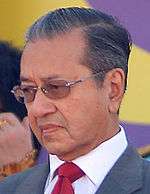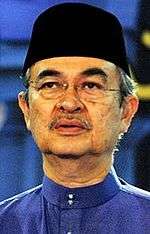Chua Jui Meng
| Yang Berbahagia Dato' Chua Jui Meng | |
|---|---|
| 蔡锐明 | |
 | |
| Malaysian Minister of Health | |
|
In office May 1995 – 23 March 2004 | |
| Prime Minister |
Mahathir Mohammed Abdullah Badawi |
| Preceded by | Lee Kim Sai |
| Succeeded by | Chua Soi Lek |
| Member of the Malaysian Parliament for Bakri | |
|
In office 3 August 1986 – 13 March 2008 | |
| Preceded by | New constituency |
| Succeeded by | Er Teck Hwa |
| Personal details | |
| Born |
22 October 1943 Muar, Johor, British Malaya |
| Political party |
PKR – Pakatan Rakyat (2009 – present) |
| Spouse(s) | Honey Hum Chim Pang |
| Occupation | Politician, lawyer |
| Religion | Christianity |
| Website |
chuajuimeng123 |
Dato' Chua Jui Meng (simplified Chinese: 蔡锐明; traditional Chinese: 蔡銳明; pinyin: Cài Ruì Míng); born 22 October 1943) is a Malaysian politician from the state of Johor. He was the country's longest serving Minister of Health, holding that position from 1990 to 2004.
Chua is a lawyer called to the British Bar as a Barrister-at-law at the Inner Temple before entering politics through his involvement with the Malaysian Chinese Association (MCA). After 35 years with the party, he quit to join Parti Keadilan Rakyat (PKR) in 2009.
Political career
Prior to entering full-time politics, Chua was a student activist in the 1970s. He was president of the Malaysian and Singaporean Law Society in the United Kingdom and Ireland as well as Editor in Chief of the Federation of UK and Ireland Malaysian and Singaporean Student Associations.[1]
Malaysian Chinese Association
Chua began his political career in 1976 when he became a member of the Malaysian Chinese Association, a component of the ruling Barisan Nasional coalition. In the 1986 general election, he was elected as Member of Parliament for Bakri, a seat he retained for five consecutive terms.
His speech in Parliament in 1988 on the "Malaysian Chinese dilemma" as a result of the "deviations and misimplementation" of the New Economic Policy (NEP) sparked the formation of the National Economic Consultative Council (NECC). The NECC formulated the National Development Policy (1990–2000), which Chua credited as key to liberalising the economy, education and culture and turning Chinese voter in favour of Barisan Nasional from the 1990s to 2004.[1]
In 1989, Chua was appointed parliamentary secretary for the Ministry of Health. He was elected as a vice-president of the MCA in 1990 and became the Deputy Minister of International Trade and Industry following the 1990 general election. During this period, he worked on developing small and medium enterprises and promoting trade with China.[1]
After the 1995 general election, Chua was appointed Minister of Health. During his tenure, Chua led the government's fight against the Coxsackievirus outbreak in 1997, the Nipah virus outbreak in 1999, the Japanese encephalitis outbreak in 2000 and the global SARS epidemic in 2003.[1]
MCA fell into crisis in 2001, when factional infighting between "Teams A" and "B" became public. Chua aligned himself to the Lim Ah Lek-led Team B during the Nanyang Siang Pau takeover crisis.[2] The 2002 party elections were cancelled, and Chua retained his vice presidency under the MCA "peace plan" of 2003, which saw Ong Ka Ting assume the presidency. However, he was dropped from the Cabinet after the 2004 general election as he was not recommended to the prime minister by the new party leader.[3]
In the following year's party elections, Chua challenged Ong for the presidency. He performed above expectations, garnering more than a third of the delegates' votes, but was unable to topple the heavily favoured Ong.[3] He made another long-shot attempt at the presidency in 2008, but lost out to Ong Tee Keat.[4] He did not contest the 2008 general election and 2013 as his former seat of Bakri fell to the opposition. [5]
Parti Keadilan Rakyat
In July 2009, Chua quit the MCA to join the opposition Parti Keadilan Rakyat (PKR), citing the need to preserve the two-party system that emerged after the 2008 elections.[6] In June 2010, the Sultan of Johor, Sultan Ibrahim Ismail revoked the state awards (carrying the titles Dato' and Dato' Seri) conferred to Chua by the previous Sultan. Chua accused Barisan Nasional of instigating the move as payback for joining the opposition.[7] He still retains the Dato' title since he was conferred other state titles by the Sultans of Selangor and Pahang.
He is PKR's chief in Johor, which is regarded as a Barisan Nasional stronghold.[8][9]
In February 2013, an open verbal conflict erupted between Johor DAP chairman Boo Cheng Hau and Chua Jui Meng, prompting calls from both DAP and PKR party heavyweights to weigh in for their party stalwarts. This as a result of accusations from either side accusing each other of splitting Pakatan Rakyat in the state of Johor.[10][11] The conflict was resolved after talks and mediation by the central leadership of both parties. One of the sign of reconciliation between Chua and Johor DAP was demonstrated when Chua received unconditional support from the DAP chief in the Segamat constituency which he was chosen to contest at the 2013 election. The seat was traditionally contested by DAP.[12] Chua was defeated in the election by the incumbent member S. Subramaniam, a federal minister.
Election results
| Year | Constituency | Government | Votes | Pct | Opposition | Votes | Pct | Opposition | Votes | Pct | Ballots cast | Majority | Turnout | |||
|---|---|---|---|---|---|---|---|---|---|---|---|---|---|---|---|---|
| 1986 | P.122 Bakri, Johor | Chua Jui Meng (MCA) | 14,818 | 48.22% | Song Sing Kwee (DAP) | 13,713 | 44.62% | Hassan bin Hussein (PAS) | 1,437 | 4.68% | 30,729 | 1,105 | 71.32% | |||
| 1990 | Chua Jui Meng (MCA) | 18,730 | 52.68% | Lee Ban Chen (DAP) | 15,619 | 43.93% | 35,556 | 3,111 | 74.94% | |||||||
| 1995 | P.132 Bakri, Johor | Chua Jui Meng (MCA) | 22,162 | 60.15% | Tan Kok Kwang (DAP) | 9,844 | 26.72% | Mohd Huridin Samuri (PAS) | 3,541 | 9.61% | 36,842 | 12,318 | 73.71% | |||
| 1999 | Chua Jui Meng (MCA) | 25,676 | 65.02% | Lim Sey Wee (DAP) | 12,316 | 31.19% | 39,486 | 13,360 | 74.15% | |||||||
| 2004 | P.145 Bakri, Johor | Chua Jui Meng (MCA) | 29,320 | 70.34% | Azhari Ismail (DAP) | 10,261 | 24.62% | 41,684 | 19,059 | 73.85% | ||||||
| Year | Constituency | Opposition | Votes | Pct | Government | Votes | Pct | Ballots cast | Majority | Turnout | ||
|---|---|---|---|---|---|---|---|---|---|---|---|---|
| 2013 | P.140 Segamat, Johor | Chua Jui Meng (PKR) | 18,820 | 47.28% | Subramaniam Sathasivam (MIC) | 20,037 | 50.34% | 39,807 | 1,217 | 84.68% | ||
References
- 1 2 3 4 Track Record of Dato' Chua Jui Meng, archived from the original on 5 May 2009, retrieved 5 July 2010
- ↑ Loh, Francis. "The Nanyang Takeover Crisis". Aliran. Archived from the original on 6 September 2009. Retrieved 8 July 2010.
- 1 2 Chin, James (29 October 2009). "Tussle between MCA top two – Redux". Centre for Policy Initiatives. Retrieved 5 July 2010.
- ↑ "Tee Keat wins, Soi Lek is MCA No. 2". The Star. 18 October 2008.
- ↑ "2013 Malaysia General Election". Retrieved 5 May 2013. Results only available from the 2004 election.
- ↑ "Chua Jui Meng quits MCA, joins PKR". The Star (Malaysia). 18 July 2009.
- ↑ "Jui Meng stripped of Datukship, blames Johor Umno". Free Malaysia Today. 10 June 2010.
- ↑ Yow, Hong Chieh (5 July 2010). "PKR to name Jui Meng Johor chief". The Malaysian Insider.
- ↑ Syed Jaymal Zahiid (8 July 2010). "Chua appointed PKR Johor chief". Free Malaysia Today.
- ↑ Lee & Gasper, Regina & Desiree Tresa (20 February 2013). "Pakatan top brass weigh in on feud between Boo and Chua". The Star.
- ↑ Gasper & Wong, Desiree Tresa & Pek Mei. "Johor DAP-PKR spat gets serious". The Star (Malaysia). Retrieved 22 February 2013.
- ↑ Pragalath, K. "DAP, PKR join forces for Battle Segamat". Free Malaysia Today. Retrieved 12 April 2013.
- ↑ "Keputusan Pilihan Raya Umum Parlimen/Dewan Undangan Negeri". Election Commission of Malaysia. Archived from the original on 6 September 2011. Retrieved 17 March 2010. Percentage figures based on total turnout.
- ↑ "2013 Malaysia General Election". Retrieved 5 May 2013. Results only available from the 2004 election.
- ↑ "Keputusan Pilihan Raya Umum Parlimen/Dewan Undangan Negeri". Election Commission of Malaysia. Retrieved 8 May 2016.

